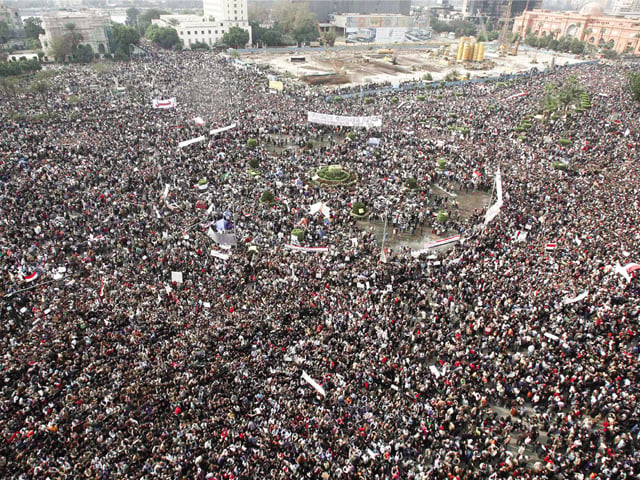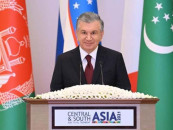Mubarak stands his ground
Egyptian president pledges to implement series of reforms, step down from presidency at the end of his term.

Egypt’s President Hosni Mubarak on Tuesday announced he would serve the remainder of his term and oversee a smooth transfer of power, drawing loud and angry jibes from more than a million people gathered in Cairo’s Tahrir Square and another million in Alexandria’s streets. The protesters rejected the president’s speech and his offer of reforms outright and insisted that he step down immediately.
In a late-night address to the nation that came after eight days of anti-government demonstrations, Mubarak said he would not seek a fresh term as president and would work in the last months of his term to allow the transfer of power. A presidential election is due in September.
He also vowed to introduce constitutional reforms including amending article 76 on who can run for president and limiting the term of the presidency.
Earlier US President Barack Obama’s special envoy delivered a message to Mubarak about the need to prepare for an “orderly transition” of power in the country, a US official said.
Tuesday’s marches were the biggest demonstrations of popular defiance seen in the country’s modern history. Cairo’s Tahrir Square was jammed with people ranging from lawyers and doctors to students and jobless poor, the crowd spilling into surrounding streets.
Crowds also demonstrated in Alexandria, Suez and in the Nile Delta in the eighth and biggest day of protests against Mubarak by people fed up with years of repression, corruption and economic hardship.
“He goes, we are not going,” chanted a crowd of men, women and children as a military helicopter hovered over the sea of people in the square, many waving Egyptian flags and banners. With the army refusing to take action against the people and support from long-time backer the United States fading, the 82-year-old strongman’s days seemed numbered.
Egypt’s opposition, embracing the banned Islamist group the Muslim Brotherhood, Christians, intellectuals and others, began to coalesce around the figure of Mohamed ElBaradei, a Nobel Peace laureate for his work as head of the UN nuclear agency.
ElBaradei said Mubarak must leave Egypt before the reformist opposition would start talks with the government on the future of the Arab world’s most populous nation. “There can be dialogue but it has to come after the demands of the people are met and the first of those is that President Mubarak leaves,” he told Al Arabiya television.
Gauging the numbers of protesters was difficult but Reuters reporters estimated it had hit the million mark that activists had called for. “Mubarak wake up, today is the last day,” they shouted in Alexandria.
Soldiers made no attempt to interfere with people. Tanks daubed with anti-Mubarak graffiti stood by. Barbed wire barricades also ringed the presidential palace, where Mubarak is believed to be hunkered down.
“We have done the difficult part. We have taken over the street,” said protester Walid Abdel-Muttaleb, 38. “Now it’s up to the intellectuals and politicians to come together and provide us with alternatives.”
Effigies of Mubarak were hung from traffic lights. The crowds included men, women and children from all walks of life, showing the breadth of opposition to Mubarak.
The demonstration was an emphatic rejection of Mubarak’s appointment of a new vice president, Omar Suleiman, a cabinet reshuffle and an offer to open a dialogue with the opposition.
Analysts said behind the scenes a transition was already under way but the military top brass would want to grant Mubarak a graceful exit.
“It is possible that people might accept an interim military leader for a short period of time – although not Suleiman. But not for as long as six months,” Maha Azzam, a Middle East expert at Chatham House think-tank in London. An election scheduled for September might have be to brought forward.
The prospect of a hostile neighbour on Israel’s western border also worries Israeli Prime Minister Benjamin Netanyahu. He hoped Israel’s 1979 peace treaty with Egypt would survive any changes that took place.
But pressure on Mubarak also came from elsewhere. Turkish Prime Minister Tayyip Erdogan said Mubarak should listen to the people’s demands. The solution to political problems lay in the ballot box, he said. Agencies
Published in The Express Tribune, February 2nd, 2011.



















COMMENTS
Comments are moderated and generally will be posted if they are on-topic and not abusive.
For more information, please see our Comments FAQ